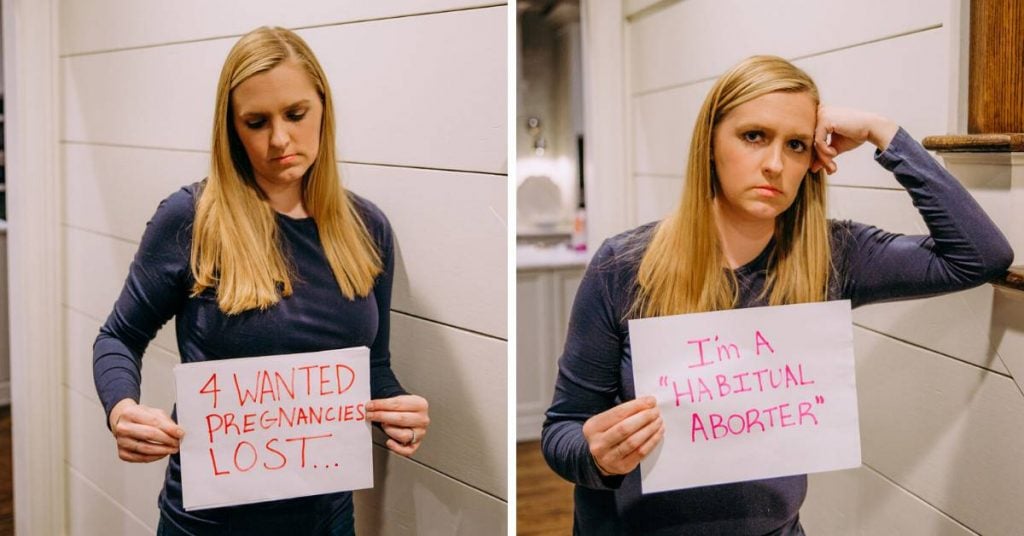When our editor saw that we were publishing an article about preventing miscarriage, she was understandably confused. After all, I spend more waking hours than I can imagine counting reminding women that their losses were not their fault. Nothing they could’ve done, I insist, could have prevented a miscarriage.
So why would I—someone who has lost 4 pregnancies and created a personal mission to destigmatize the subject of pregnancy loss—write about how to prevent a miscarriage?
I’ll tell you.
Please know I’m talking to you as a friend here. The kind of friend who loves you so dearly that she tells you exactly what you don’t want to hear because it’s just that important that someone say it.
You’re likely reading this during your first trimester, scared, and looking for reassurance. But what you deserve is loving honesty, so here it is.

This site contains affiliate links, meaning that we earn a small commission for purchases made through our site. We only recommend products we personally use, love, or have thoroughly vetted.
Is preventing miscarriage actually possible?
Friend, there is almost nothing you can do to prevent a miscarriage.

I know that’s not the answer you want to hear, but it’s the truth, so it’s the answer you deserve. But stick with me because I’ve been in your shoes, I know how scared you are, and I’m here to help.
Let me remind you that the odds are in your favor. 3 out of 4 pregnancies carry safely.
And of the 1 in 4 pregnancies that do end in miscarriage, those numbers are slightly skewed by people like me who lose repeatedly. 1 in 100 women experience recurrent miscarriage.
Also, if you experience a loss, we’re here to help, and the chance of experiencing back-to-back losses is very low.
What about all those recommended precautions during early pregnancy?
I hear you. I know there are all sorts of rules about what not to do during pregnancy.
But here’s the problem. Those rules cause a false sense of fear that we’re going to doom our pregnancies over a cup of coffee or a slice of deli meat.
I’m not telling you to ignore rules your doctor says are important. But I am telling you this.
That coffee you caved and had last Tuesday? It will not cause you to lose your pregnancy. You’re a good mother, even if you drink coffee while pregnant. Let’s practice not judging ourselves so harshly.
Here, I’m going to debunk some myths and tell you some things that have shown efficacy in preventing miscarriage—under specific circumstances, and only with your medical provider’s approval.
More than anything, I hope to empower you to trust yourself and your body. I know how scary this is. But you can do it, mama.
Why you can’t actually prevent a miscarriage
Most first trimester miscarriages are caused by chromosomal abnormalities and would’ve occurred no matter what your behavior.
According to the UK’s National Institute of Health, many others are caused by uncontrollable issues like anatomical abnormalities (the likely cause of my 4 losses), autoimmune diseases, placental problems, and infection.
That is, the vast majority of miscarriages are caused by issues that are completely out of our control. They’re up to genetics, our bodies, and as much as I hate to say it, luck.
I can’t tell you how often I get frantic messages from readers asking me how to stop a miscarriage in progress.
I’m so sorry, but I have to be honest with you here and tell you that, once a miscarriage begins, there’s truly nothing you can do but take care of your body so you can complete the process healthily.
But even if that happens (and the odds are in your favor that it won’t), nothing you did could have prevented it. Women do not cause their own losses!
What you can do to foster a safe and healthy pregnancy
Although you can’t usually prevent miscarriage, there are things you can do to foster a safe and healthy pregnancy so that you and your unborn baby can have the healthiest bodies possible.
Sometimes, doing these things can help us feel more empowered, but I want to do some myth-busting as we talk through the things you can do.
It’s important we understand what helps foster a healthy pregnancy vs. what causes fear and anxiety when it’s unnecessary. Some pregnant women are motivated to improve lifestyle behaviors because of pregnancy, while others feel stifled by the rules.
You do you, mama.
Precautions during early pregnancy
So let’s talk about those precautions during early pregnancy. They’re pesky, they often make us feel guilty, but they exist for a reason. So let’s think through them in a little more detail.
Myth #1: Prenatal vitamins with folic acid are life
I will absolutely not contest the importance of prenatal vitamins. But if your pregnancy is a surprise and you haven’t already been taking them for months, don’t stress. Just start now.
TL/DR: Start taking a prenatal vitamin now. We recommend this one by Natalist.
Also, let me rant a bit about folic acid. In the early 2000s, a major public health campaign started hammering into young women the need to take folic acid for healthy pregnancies.
I’m all for public health campaigns, but this one had me, a freshman in college, taking folic acid to prepare for the pregnancy I hoped to have some time within the next 10-15 years.
Madness!
And then, when I was experiencing recurrent miscarriage, I learned something alarming through an amazing technology called the Genate Test. I have a very common genetic variation called MTHFR; my specific variant prevents me from properly absorbing folic acid.
And do you know how common this genetic variation is? Estimates are that up to 50% of people have it, although some of those people have a type that does not inhibit the absorption of folic acid.
I’m not telling you to stop taking folic acid. Some people with this variant can still process it, and the CDC says it’s the only type of folate that has shown efficacy in preventing neural tube defects.
But since there’s about a 50% chance that you have a copy of this genetic variant and you don’t know (1) if you have it or (2) if you have the type that makes processing folic acid a problem, I highly encourage talking to your doctor about taking a prenatal vitamin with methylated folate instead.
Any vitamin with methylated folate should include 5-MTHF (also called 5-methyltetrahydrofolate), which processes easily as folic acid.
Confused? Sorry. How about this? Start taking a prenatal vitamin now. We recommend this one by Natalist.
Myth #2: What you eat, the baby eats
It’s true that eating healthily can help foster a healthier pregnancy. Staying within recommended limits for weight gain, for instance, helps reduce your risk of complications like gestational diabetes.
If you want to really hone in on the healthiest eating possible for your pregnancy, we recommend Eating for Pregnancy, a month-by-month guide to the vitamins and nutrients you need most, including a cookbook to make your life easier.
But if you see the cover of this book and feel guilt, shame, or panic because your food aversions include saying no to vegetables, here’s what I want you to know.
Yes, good nutrition is best. However, our bodies are designed to help our growing babies survive and thrive. They take all the nutrients first, and we get what’s leftover. Hence common pregnancy issues like lethargy, mouth sores, and other symptoms of vitamin deficiency are often greater during pregnancy.
Our babies are little leeches taking all our nutrients. So while you may not feel your best if your dietary habits aren’t by-the-book, don’t feel guilty about it for baby’s sake.
Warrior mamas survive HG (hyperemesis gravidarum) where they keep nothing down their entire pregnancies, and they usually birth healthy babies.
Those cookies aren’t hurting your little one, nor is your strong aversion to broccoli.
Myth #3: Coffee causes miscarriages
I’m not going to lie. I did switch to decaf when I was pregnant with Jack. But it was for personal comfort, not because I was afraid a cup of coffee would cause me to lose him.
I lost many pregnancies drinking decaf, so I know that wasn’t the game changer for me.
Here’s what I want you to know about caffeine. Does consuming caffeine increase your miscarriage risk? Yes. But only if you are drinking it in very large quantities.
The evidence about how much caffeine is okay is conflicting, according to the American Pregnancy Association (APA). Just to be on the safe side, they recommend consuming no more than 200mg of caffeine per day.
How much is in your coffee? Roughly 95mg, but depending on size and brew strength, the APA says anywhere from 95-165mg.
What about your favorite latte? Roughly 77mg, but for the same considerations, the APA says it could range anywhere from 63-126mg.
The takeaway: Stick to one cup, and talk to your doctor about an appropriate modification if you feel you need more. Then, ne careful with places where you might unexpectedly get more caffeine (like from tea, chocolate, or migraine medicine).
And yes, there is a small amount of caffeine even in decaf coffee, but it’s nowhere close to the recommended limit, so please don’t worry over that.
Myth #4: Stop taking medications as soon as you find out you’re pregnant
Medications and pregnancy–SUCH a tricky subject. But here’s what I want you to know. While some medications during pregnancy do increase the risk of miscarriage, others are safe, and then there are still others that we don’t have enough data to know one way or the other.
Talk to your doctor about the risks involved in your medication regimen instead of making decisions on your own.
As Alexandra Sacks, MD and Catherine Birndorf, MD explain in their book What No One Tells You, it’s important to consult with your healthcare provider and to be “completely honest.” “If you’re taking psychiatric medications, whether or not to continue them during pregnancy is a complex subject,” the authors explain.
After all, immediately stopping medication your body has become dependent on may do more harm than staying on them, or slowly weaning off of them.
Talk with your doctor openly and honestly to help make the best decisions for you.
Myth #5: Disappearing Pregnancy Symptoms Mean I’m Miscarrying
I can’t tell you how often people come to me in a panic because their morning sickness disappeared at 10 weeks. So please, let me put your mind at ease.
While it’s possible that decreasing pregnancy symptoms could indicate decreasing HCG levels, which could trigger a miscarriage, it’s also very common for symptoms to disappear on their own as your hormones level off.
And in the case of a missed miscarriage, symptoms may continue even after a pregnancy becomes nonviable. This happened with my first pregnancy; I had a blighted ovum miscarriage, and I was hovered around the toilet the very night before my scheduled D&C.
Yet with Jack, I never had morning sickness or heartburn like with the first pregnancy that was nonviable from the beginning.
So unless your sudden loss of symptoms is accompanied by vaginal bleeding, especially heavy bleeding, try not to worry. But as always, call your doctor if you’re concerned.
How to prevent recurrent miscarriage
I cannot possibly end this article without covering this subject because recurrent miscarriage is one of the few instances where prevention of pregnancy loss may be possible.

Recurrent pregnancy loss is rare, and in 50% of cases, specialists are able to find a cause for the losses. If you’ve lost 2 or more pregnancies, I recommend advocating for yourself with your doctor so you can access recurrent miscarriage testing.
If your doctor is able to find a problem, then they can likely solve it. But even if you’re in the 50% of cases with unexplained recurrent pregnancy loss, your chances of carrying a future pregnancy successfully without medical intervention are still decent.
After 4 losses, I was told by my high Maternal Fetal Medicine specialist that my chances were still over 70%.
Depending on what your test results reveal, you may be prescribed medication to prevent miscarriage.
Commonly Prescribed Medications to Prevent Miscarriage
- Progesterone, a hormone that helps sustain early pregnancy, is often prescribed in the first trimester to help women sustain their pregnancies longer.
- While the jury is still out on whether it helps, baby aspirin is often used to reduce the risk of blood clots during pregnancy. Some doctors will also prescribe blood anticoagulants that must be injected, specifically Lovenox and Heparin, though these drugs are significantly more controversial among patients who do not have a diagnosis of .Antiphospholipid Syndrome (APS).
- Although I’ve personally never seen it prescribed, a 2020 study out of the UK suggests that diabetes drugs that contain gliptins may begin being prescribed to treat recurrent miscarriage.
- In some cases, doctors will prescribe immunosuppressants to help a woman maintain a pregnancy, working under the theory that her body may be overreacting to the pregnancy and attacking it.
- Steroids are often used to help prevent miscarriage in women with connective tissue disorders, including rheumetological and autoimmune disorders.
I’ll reiterate, though, that these medications are prescribed under specific circumstances. We do not support taking medication to prevent miscarriage without first consulting your doctor about your specific situation!
We know this time is scary, but we’re here for you. You can get through it, mama. One day at a time.
Did you worry about how to prevent miscarriage during early pregnancy? Tell us about your experience in the comments.












